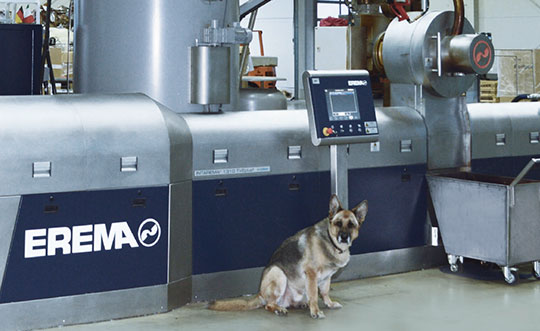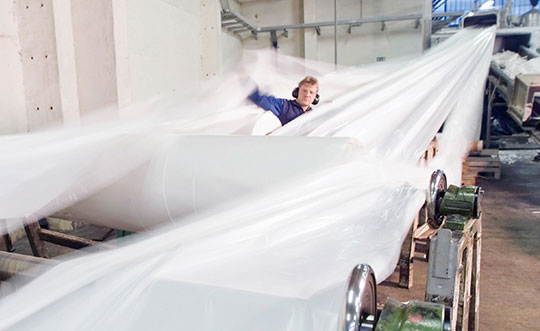Cushing Plastic had to find a solution for all the edge trim and make ready waste of their new CPP line. Instead of selling high quality waste to recycling companies for a very low price, they decided to take this matter into their own hands and recycle the material themselves to sell it with way higher margins.
In 2014 the Fanipol, Belarus based company Cushing Plastic installed their Intarema recycling line from Erema to pelletize the waste of their then new Colines cast film line. The company already had a 16 year old CPP line, but with the investment in a new state-of-the-art extrusion line not only the output got up but also edge trim waste and make ready waste. Previously they sold their waste to recycling companies for pennies on the dollar, or kopeks on the ruble if you will. Cushing felt that there has to be a better solution, so they took a closer look at the offerings of recycling machinery manufacturers.
The decision making process
Nikolai Nichiporchik, Director of Cushing Plastic and engineer by trade, has analyzed all the solutions available from Austrian, Italian and Taiwan based suppliers. They also visited some installations of the lines they were interested in and talked to the users. “The feedback we received for Erema's installation was in general very positive. Another important factor was that they were able to produce a line with a short screw on request. For quality reasons we have chosen the Erema line and we are glad to have it on our production floor."
Now they can sell their own regranulate for a price that is very close to what raw material would cost. "We used to sell out waste for about EUR 0.25, and now the regranulate from the Erema line goes over the counter for more than EUR 0.90. When taking into account the personnel and energy costs, we still make about 150-200% more profit."
Since the line is not running at full capacity, Cushing Plastic estimates the ammortisation time for the Intarema line with a couple of years. There are plans for investing in another new CPP line, with which's waste the Erema would get closer to a 24/7 production, and therefore a shorter return on invest. “For terms of quality and as a future investment, it was absolutely crucial for us to buy the Intarema." Cushing Plastic doesn't run the line continuously. What they would do is to collect their waste until they have enough to keep the line running for at least a week straight without interruption. In theory they could buy waste from other companies to regranulate and sell it with profit, but have decided against this as you never know about the clarity and quality of foreign material.
The Intarema 605 T from Erema
The systems installed here are “T” systems with its preconditioning unit. The preconditioning unit has specific benefits: above all, the perfect preconditioning of the remaining material prior to extrusion is crucial for the quality of the recyclate. Erema fulfils this requirement with its systems by combining a preconditioning unit with the recycling extruder. This means that films of varying thicknesses can be cut, heated and compacted to a uniform bulk density of around 350 kg/m³. The material which is compacted this way can be added continuously and pulsation and process fluctuations are ruled out. Another positive aspect of the preconditioning unit is the preheating of the materials so that less energy intake for plastification inside the extruder is required and thermomechanical stress on the polymer is minimised. Finally, the preconditioning unit carries out the degassing process. This is because moisture deposits on the film scrap can occur from time to time due to fluctuations in temperature and air humidity when in-house waste is kept in storage. What probably made the biggest difference for Cushing was the service. This even made them to change their decision. "In general we think the customer service we receive from Erema is outstanding. The sales manager for this region, Kalojan Iliev, often stops by to see if there is anything they can do to help us with. We are a very small client to them, but they treat us with lot of respect. To be honest, before talking to Erema our mind was set for a producer from Taiwan. We were ready to sign a contract with them."
About a visit at the Erema Customer Centre, Mr Nichiporchik said: "On paper the line has an output of about 100 kg/h for PP and about 70 kg/h of stretch. We visited Erema, they ran the line with 150 kg/h of PP and stretch respectively. We were very impressed by the peak performance of the line."
He said that it is not a secret that every line has it's own flaws and issues. And especially the installation of a new line is challenging. When comparing the after sales service of Erema with that of some of the other manufacturers of the machinery at Cushing, he considers it the highest level possible. "Spare parts arrive in a very short amount of time, and if we have a question by email we almost get an instant response. Furthermore the line itself is very easy to handle."
| Application: | Inhouse & industrial recycling |
|---|---|
| Materials: | Edge trim (LDPE, PP, PA/PET, BOPA, PLA etc.) |
| Product category: | INTAREMA |
| Modell Details: | INTAREMA 605 T |


Nikolai Nichiporchik
Director of Cushing Plastic

COPO PLAST, Germany
The first INTAREMA® system in Germany was installed in spring 2014 at Heinrich e.K. of Traunreut. Copo Plast uses its TVEplus® 1310 with Laserfilter LF 2/350 to process 10,000 tonnes of heavily printed multilayer materials ...

POLIFILM, Germany
Business with bin liners, construction and agricultural films in the highly competitive environment is only effective and worthwhile if recycling materials are used for their production – up to 100% in some cases. The use of recyclate, however, is also